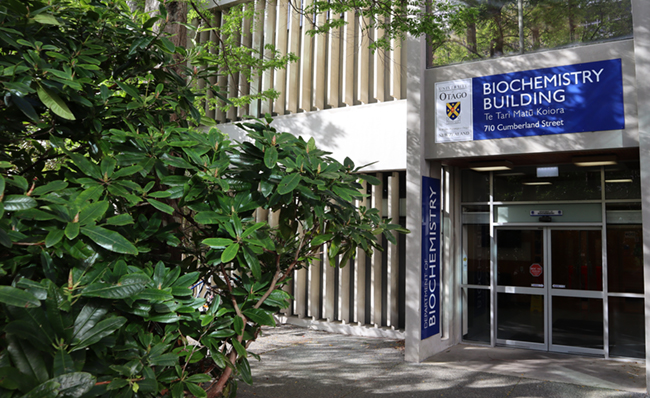Wednesday 25 March 2020 11:03am

Now that campus has closed, Otago Biochemistry staff have less than one week to get home offices set up, on-line lecture technology tested, and alternatives to hands-on laboratory classes finalised before teaching begins again on Monday, this time entirely online. We have also had only two days to ensure the safety of all the equipment and materials in the research laboratories.
The University had planned a phased transition to on-line learning, starting with the larger classes at the beginning of this week. The Covid-19 virus had other ideas, however, so we have had to accelerate our plans considerably. Crash courses in using Zoom have been held, so we can continue to hold virtual meetings and lectures that are lively, if not live. We have had to ensure that these lectures are recorded and made available for students whose internet speeds are not good enough to cope with live streams. We have racked our brains to imagine any possible thing that could go wrong, and find appropriate solutions.
Laboratory classes are impossible to run at a distance, but luckily many students have already completed a substantial laboratory component for this semester. Paper coordinators are busy rejigging the remaining practical sessions to convert hands-on laboratory work into data analysis only, and designing “plan B" for the semester two laboratory courses. Fortunately, so much biological science these days requires people to analyse the vast amount of data generated by sequencing technology.
Biochemistry research laboratories require a great deal of maintenance. Most of our biological samples (which include anything from bacteria, to human tissue, to plants) are used and stored in strictly controlled environments. We have vats of liquid nitrogen that need replenishing regularly, ultra low temperature freezers, and growth rooms with special lighting and atmosphere for plants, bacteria and fungi. All of our current cell culture and bacterial/yeast growth experiments have been cut short or abandoned and the samples safely frozen down. Our laboratories also contain extremely expensive equipment that have complicated washing and protective procedures if they are to be left unused for any period of time.
All that has been done, and we think we are as prepared as we can be. Just one staff member will remain at work during the lockdown period, our heroic storeperson, Nigel Alefosio. He is responsible for accepting mail and courier deliveries, and storing these items in the appropriate conditions. He will keep the liquid nitrogen vats topped up so that our cell culture stocks don't die. He will ensure that backup generators are hooked up in case of power cuts. He will also be rather lonely in that big building all by himself, with such a large responsibility - when this is all over I think we'll all have to be extra-specially kind to him.
Finally, many students will be using the two day Covid-19 Level 3 grace period to return to their family homes, but many are remaining in hostels and flats. Some of these students will be enjoying a slightly more active social life than the rest of us, able to socialise with their peers at communal meal times and in recreation areas of their hostels. Others though, have been unable to travel to families in other countries, and some postgrad students have just recently arrived in New Zealand and have not yet developed a network of friends. They have not only loneliness to contend with, but worry about the families they left behind. However, laboratory supervisors have the pastoral care of students very much on their minds, the Department as a whole is a close community, and we will work hard to support each other.
As our currently acting HOD, Sigurd Wilbanks, says, "The Biochemistry Department is well prepared to meet the challenge before us. I am confident that each of us is committed to containment of the Covid-19 virus and prepared to sacrifice our current productivity to saving lives."
Kia kaha and be kind!
